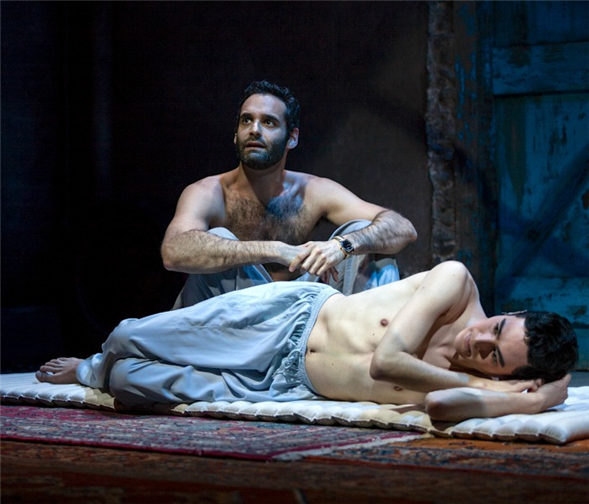Translate Page

A new Off-Broadway musical explores the outlawed Afghan practice of bacha bazi
---
How do you craft a love story between two adolescent males who don't understand the concept of gay identity? That was just one of the conundrums composer Tim Rosser and lyricist/book writer Charlie Sohne faced when they decided to make a musical set in Afghanistan's illegal world of bacha bazi, where wealthy, usually married men purchase young boys, train them to dance, sexually abuse them, and often rent them out to the highest bidder. Doesn't sound like the kind of material that sings? Rosser didn't think so either at first. "When Charlie mentioned the idea of it, I was like, oh lord!" he remembers. "Then he showed me the documentary, and I was very affected by it."
Although that 2010 Frontline episode, "The Dancing Boys of Afghanistan," introduced them to this sordid yet fascinating scene, it only served as a jumping off point. Their musical, The Boy Who Danced on Air, currently running at the Abingdon Theatre Company, is a fictional story centering on the romance between two bacha bazi teens: the subservient Paiman and the rebellious Feda. Though they've been forced to engage in sexual activities with their male owners, the idea of same-sex love is foreign to them. When they kiss passionately, their emotions and hormones leading the way, Paiman is so confused he asks what's happening. "When these boys talk about their vision of what their lives can be like, they're not thinking about getting an apartment together in Hell's Kitchen with a small dog," Sohne says.
{Image1}
Pedophilia, slavery, sex trafficking -- these are very dark and uncomfortable subjects for a musical to mine. But the creative team has been careful to avoid exploitation. Paiman and Feda are played by Troy Iwata and Nikhil Saboo who, though youthful, are grown men. Sex between the boys and their owners is implied but never shown. Even the opening sequence, when a 10-year-old Paiman is sold to Jahandar (Jonathan Raviv), is handled delicately. Director Tony Speciale stages the boy's indoctrination into bacha bazi via shadow play, which enhances the size disparity between master and servant. But perhaps the biggest challenge was making sure all the characters came off as three–dimensional. Even Jahandar, reprehensible as he often is, cannot be merely dismissed as a villain. Though he abuses Paiman, he also loves and protects him, and believes strongly that bacha bazi is an ancient tradition worth preserving.
"Initially I was just so drawn to the stories of these boys, and their struggle to carve out a space for themselves," Sohne says. "But as I researched more, I began to realize the men were in a similar situation, in a way. A lot of them consider themselves very devout and yet bacha bazi is forbidden in Islam. These men had to figure out how to meld their religion to the practice. It was very important to us not to graft a Western idea of sexuality or identity on the characters. I think getting that right and making sure it wasn't just like a gay love story plopped in the middle of rural Afghanistan was important."
Still, in many ways The Boy Who Danced on Air is distinctly American. Its soaring pop songs, which won Rosser and Sohne a 2015 Jonathan Larson Award, are reminiscent of Ahrens and Flaherty (Anastasia) and Pasek and Paul (Dear Evan Hansen). Yet the orchestrations are infused with Afghan cadences and instrumentation, like the rubab. "We wanted to write a piece that mixed together many influences, so it felt familiar in a way and transportive in another," says Rosser.
It's been a six-year development process for the show, which was presented in an earlier incarnation at the National Alliance for Musical Theatre in 2013, and had its world premiere at San Diego's Diversionary Theatre last summer. Speciale helmed that production, too and, as the artistic director of Abingdon, he decided to bring The Boy Who Danced on Air to New York City as the company's first-ever musical.
Rosser and Sohne are well aware that some theatregoers won't even be able to get past the description of the show, let alone the experience of watching it. And they're certainly not trying to normalize or condone bacha bazi. But they believe that those who go on the sometimes distressing journey will be engaged and challenged. "We didn't want audiences to walk away thinking, oh, that's just what they do over there," he says. "We wanted them to see elements of our common humanity. That's part of the power of song: it can create understanding."
---
TDF MEMBERS: TDF MEMBERS: At press time, discount tickets were available for The Boy Who Danced on Air. Go here to browse our current offers.
Follow Raven Snook at @RavenSnook. Follow TDF at @TDFNYC.
Top image: Jonathan Raviv and Troy Iwata. Photos by Maria Baranova